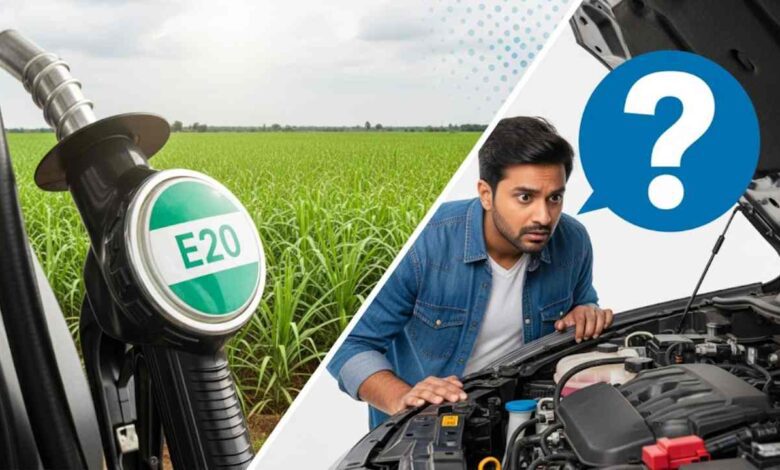E20 Fuel: Is E20 Fuel Secretly Costing You More? The Mileage Debate Explained

E20 Fuel: Currently, E20 fuel has become the center of discussion among vehicle owners in India. While the government is promoting this new petrol to protect the environment and reduce crude oil import costs, there is growing concern among the general public about reduced mileage and damage to vehicle engines. Let’s explore every aspect of this debate in detail.
What is E20 Fuel?
E20 fuel is a blend of petrol containing 20% ethanol and 80% petrol. This ethanol is primarily produced from crops like sugarcane and maize, which is considered relatively better for the environment. The Indian government has set a target to ensure the use of E20 petrol nationwide by 2025.
Government’s Argument and Benefits
According to the government and the Ministry of Petroleum, there are several benefits to using E20 fuel:
- Reduced Imports: As ethanol is produced domestically, the amount of crude oil imported from abroad will decrease, strengthening the country’s economy.
- Increased Farmer Income: The use of crops like sugarcane and maize for ethanol production will benefit farmers.
- Environmental Protection: The combustion of ethanol emits less harmful gases like carbon monoxide, thus helping to control pollution.
- Improved Performance: The government claims that due to ethanol’s higher octane number, using E20 fuel improves vehicle performance and makes the engine run smoother.
Public Concerns and Complaints
Despite the government’s claims, there are allegations that the general public is facing several problems using E20 fuel. The main concerns are:
- Decreased Mileage: According to many users, using E20 petrol has reduced their vehicle’s mileage by 10% to 20% or even more. While the official figure suggests a 3-6% drop, the real-world experience is completely different. This has significantly increased travel costs.
- Risk of Engine Damage: Ethanol attracts more water than petrol. Since the fuel pumps, pipes, or other parts of older vehicles (manufactured before 2023) are not ethanol-resistant, there is a fear of them rusting or getting damaged.
- Lack of Alternatives: The biggest complaint from consumers is that there are no alternatives like regular petrol (E0) or petrol with lower ethanol content (E5, E10) available at fuel stations. As a result, everyone is forced to use E20 fuel.
The Legal Battle and Future
Highlighting these issues, advocate Akshay Malhotra has filed a Public Interest Litigation (PIL) in the Supreme Court. The petition alleges that mandating E20 violates consumer rights and that companies may refuse to provide insurance for vehicle damage. In response to this case, the Supreme Court may direct the government to maintain transparency, such as mentioning the percentage of ethanol at fuel pumps, providing alternative fuel options for older vehicles, or forming an independent committee to investigate its long-term impact.
Overall, the debate over E20 fuel is at its peak. Finding a balance between the government’s good intentions and the real-world experiences of the common people is now the biggest challenge.

